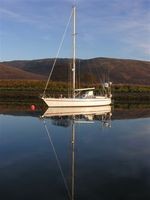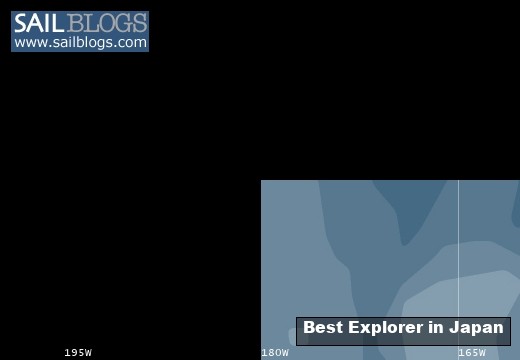
S/Y Best Explorer
Italian cutter, 51', from Mexico to Galapagos, Marquesas and Tahiti, then to Fiji, Australia, Solomon Islands, Philippines, Japan and Northeast Passage to Tromsø
03 July 2019 | The Passage
03 July 2019 | The Passage
18 May 2018 | Verso Okinawa
29 April 2018 | Verso Subic Bay, Filippine
29 April 2018 | Cebu, Filippine
29 April 2018 | Verso Cebu
28 April 2018 | Verso Cebu
28 April 2018 | Verso Cebu
27 April 2018 | Verso Cebu
27 April 2018 | Verso Cebu
26 April 2018 | Da Wayag a Ternate
26 April 2018 | Da Wayag a Ternate
22 March 2018 | Sorong
21 July 2017 | The Passage
19 July 2017 | Batanta
18 July 2017 | Helena Marina Sorong
11 July 2017 | Penumu, Raja Ampat, Irian Jaya
10 July 2017 | Batanpele, Irian Jaya
09 July 2017 | Gam, Irian Jaya
06 July 2017 | Sorong, Irian Jaya
Night watch
03 July 2019 | The Passage
Nanni
Guardia di notte Sono solo in pozzetto, all�'una di notte. E�' il mio turno di guardia: tre ore in osservazione per controllare la rotta, lo stato del mare e soprattutto le altre barche e le navi, per evitare pericolosissime collisioni. Il mio viso è appena illuminato dal riflesso della luce rossa che mostra la rosa della bussola e dalle luci verdi degli strumenti. Alla mia sinistra lo schermo del plotter è nero, perché questo è lo sfondo della finestra radar sul quale si mostrano le righe che segnano la nostra prua e la direzione della navigazione. Fuori dal pozzetto coperto che mi ripara dal vento e dall�'umidità della notte c�'è il buio. Ma non è totale: siamo immersi in una nebbia fitta che limita la visuale appena oltre la prua, ma diffonde tutto intorno la luce dei fanali di via. Soprattutto quella di dritta, verde, tanto che devo sporgermi all�'esterno per controllare se quella di sinistra, rossa, sia ancora accesa, come è in realtà. L�'alone luminoso impedisce allo sguardo di penetrare oltre il pulpito di prua, in queste condizioni sarebbe impossibile accorgersi della prossimità di qualunque nave o barca, per quanto i suoi fanali fossero potenti. Così lo sguardo si posa incessantemente sul radar alla ricerca di punti luminosi persistenti fra la miriade di echi fluttuanti riflessi dalle onde. Il vento è leggero sulla rotta che abbiamo scelto a ovest della catena delle vulcaniche isole Kurili, nel Mar di Okotsk, proprio per allontanarci da una depressione che si prevede passerà a un centinaio di miglia ad oriente, sul Pacifico. Vengo distratto da improvvisi lampi di luce che provengono da entrambi i lati della barca, poco più avanti del pozzetto. Guardo meglio attraverso le finestre appannate dall�'umidità e vedo la cresta dell�'onda provocata dalla barca che si frange con una linea di vivissima luce: è un�'eccezionale bioluminescenza che l�'onda disturba ed eccita e che ogni pochi secondi, forse perché incontra un organismo più grande, esplode in un lampo globuloso bianco che dà addirittura forma alle strutture della copertura del pozzetto. Guardo la scia che si allontana dalla poppa e vedo un sentiero lattiginoso luminescente che si perde nella nebbia: che spettacolo! Il mio compagno, perché non sono solo! non è in grado di apprezzarlo. Un piccolo uccello delle tempeste è venuto a rifugiarsi stanchissimo sopra le scotte arrotolate dietro di me. E�' color nero fumo, grande più o meno come un merlo, con le lunghe sottili zampe palmate, il becco adunco e la caratteristica fronte globosa sporgente. Provo ad accarezzarlo delicatamente sul dorso e sulla testa e lui non mostra timore. Una mezz�'ora più tardi si avvicina ad una chiusura lampo un po�' sollevata e scivola via sul ponte bagnato: dopo qualche minuto è scomparso nella notte. Continuo la mia guardia interrotta dalle chiamate via radio di una radio russa, acque nelle quali siamo entrati da poco, che vuole sapere i nostri dati in un inglese un po�' approssimativo che rende la conversazione meno facile di quanto si potrebeb desiderare, ma poi ringraziano e chiudono bruscamente il contatto. La nebbia è ancora intorno a noi. La guardia stanotte sarà più lunga del solito! Night watch I stand on the cockpit, it�'s one a.m. It is my shift: three hours controlling our course, the sea conditions and above all the other vessels, to avoid extremely dangerous colisions. My face is barely lighted from the reflection of the red light of the compass and from the green lights of the instruments. On my left side the plotter�'s screen is black: this is the color of the radar window with the lines showing our heading and our course. Outside the covered cockpit sheltering from wind and night humidity it�'s all dark. But not completely black: we are surrounded by a thick fog barely letting us see the bow, but diffusing the navigation lights all around. Especially teh starbord one, green, so much that it compelles me to verify form outside the shelter that the red one, port side, is still on, as it is. The refraction of the lights prevents me from seeing anything beyond the bow, in these conditions it will be impossible to spot any nearby vessel despite the power of its navigation lights. So I am restricted to continuously verify if there are any bright persistent spots on the radar screen within the many vanishing ones caused by the waves. The wind is light along our course west of the volcanic Kurili Islands, on the Okotsk sea, selected with the aim to remain as far as possible from a low forecasted to pass a hundred miles east, on the Pacific side. I get distracted by sudden flashes coming from both sides of the boat, just forward of the cockpit. I look through the misty windows and see the edge of the bow wave braking with a line of strong light: it�'s an exceptional display of biological fluorescence excited by the wave and that every few seconds, may be hitting a larger animal, provokes an explosion of globular light so strong to let me see the internal structures of the cockpit frame. I look at the wake behind the stern and see a luminous path fading into the fog: what a show! My companion, because I am not alone! is not in a condition to appreciate the show. It is a tiny storm petrel extremely tired that found shelter over the yankee sheets lying in the cockpit behind my back. It�'s smoky black colored, approximately the size of a blackbird, with long thin legs, the hooked bill and a special bulging head. I carefully try to caress its head and back and it doesn�'t seem to be afraid. Half an hour later he moves near an opening af a zipper and slides out on the wet deck, a few moments later is gone. I continue my watch interrupted by the Russian radio calls, we are in Russia now, wanting to know details of pour boat and voyage in a faltering english that makes our conversation less easy than desirable. At the end they thank us and suddenly close the transmission. The fog is still all aroud us. The night watch will be longer than usual!
Cortesie
03 July 2019 | The Passage
Nanni
Cortesie Addio Giappone! Stamattina all�'ufficio immigrazione abbiamo completato le ultime formalità prima della partenza. Se in aeroporto dovessero perdere e farci perdere tutto questo tempo per uscire dal Paese, credo che le compagnie aeree lavorerebbero un decimo di quello che fanno; chissà che senso ha applicare criteri tanto difformi nelle due situazioni. Seki San ci aspettava presso la barca col suo camioncino con cui ci aveva liberato di spazzatura e olio motore esausto. Un giapponese minuto, con una barbetta rada e i capelli ancora neri corti corti, i pantaloni di tela macchiati e strappati, nativo settantaquattro anni fa dell�'isola ormai russa di Shakalin e che mi ha fatto anche un breve accenno, in inglese! alla guerra che ha tolto al Giappone sia quella che le isole Kurili, verso cui ci stiamo dirigendo. Seki è un velista, così come sua figlia che è imbarcata come marinaio su una barca americana che naviga in questi giorni nelle isole Aleutine, tra Attu e Dutch Harbor. Ha navigato per mezzo mondo e non solo ci ha fatto trovare alla mattina del nostro arrivo due poderosi parabordi che ci hanno riparato dalla risacca delle barche da pesca, ma ci ha portato a fare la spesa, ci ha procurato il gasolio detassato di cui avevamo bisogno, ci ha risolto un annoso problema con il contagiri, ha preavvertito i doganieri e l�'immigrazione, ci ha fatto riempire le bombole di propano e insomma ci ha preso sotto la sua tutela mostrando di conoscere abbondantemente le nostre necessità e di risolverle in un batter d�'occhio. Mentre lo ringraziavo dei servizi resi poco prima della partenza, usando tutto il tatto possibile, gli ho chiesto come avrei potuto ricompensarlo del tempo e della benzina spesi per noi. �"L�'ho fatto perché sono un velista anch�'io, non voglio nulla�". �"Ma posso almeno darti una bottiglia di vino?�". �"No, grazie, nulla, davvero!�" Ci siamo scambiati gli indirizzi mail e sono certo che a Petropavlovsk Kamchatski troveremo qualche suo amico pronto a darci una mano come ha fatto lui. Strano? Eccezionale? Affatto. Possiamo contare episodi analoghi quasi per ogni angolo del mondo, purché remoto e dove noi siamo accolti come viaggiatori e non come turisti. Islanda, Groenlandia, Nunavut, Seward in Alaska, Isole Marchesi, atollo di Palmerston, Vanuatu, ecc. E�' ovvio che talvolta la ricompensa è stata data, ma sempre sotto forma di riconoscimento amichevole per uno sforzo e magari un anticipo di denaro per nostro conto. Il turismo invece mercifica il rapporto, per cui si paga e si pretende di ottenere. In viaggio si ottiene e si riconosce la cortesia e la disponibilità, sai che differenza fa nei rapporti umani?
Kindness So long, Japan! In the morning at the Immigration office we completed the papers for exiting the Country. If in the airports the same procedures should apply and should waste theirs and our time in the same way I guess that air companies would serve one tenth of the passangers. I really do not see the meaning of using two different procedures in two similar situations. Seki San was waiting for us near the boat with his small truck with which he cleared our waste and our used black motor oil. A small framed Japanese with a short beard and short hairs still mostly black, clean but spotted and torn trousers, born seventy four years ago on the Shakalin Island now Russian and that briefly mentioned, in english! the war that took from Japan Shakalin and the Kurilis islands toward which we are heading now. Seki is a sailor as well as his daugther at present onboard as crew on an american boat sailin the Aleutians between Attu and Dutch Harbor. He sailed almost on half the world and not only put a couple of additional large fenders while we were asleep to protect our boat from the fishermen�'s waves, but brought us to buy victuals, let the diesel supplier to fill out tanks with tax free fuel, solved a nasti small problem with our tachometer, warned the immigration and customs officers of our departure, let us have the propane bottles refilled and in summary took care of us showing a complete knowledge of a sailor�'s need fulfilling them in the blink of an eye. While I was thanking him just before setting out, using the maximum possible dipolmacy I asked him how could we possibly reciprocate his courtesy, time and fuel spent with some money. �"No way, I did it as I am a sailor like you, guys, I do not want anything�". �"But, at elast, may I offer you as a gift a bottle of wine?�". �"No thanks, really, I do not want anything, really!�". We exchanged or e-mail addresses and I am sure that in Petropavlovsk Kamchatski we will meet son friend of his ready to help us the way he did. Strange? Exceptional? No way. We can tell of many similar stories we experienced almost everywhere around the world, provided that it was remote and without tourists, being received as travellers. Iceland, Greenland, Nunavut, Seward in Alaska, Marquesas Islands, Palmerston Atoll, Vanuatu, etc. Clearly enough sometimes the money recognition has been given, but always as a friendly offer to compensate for a special effort and may be for an advance money spent on our behalf, Tourism, on the contrary, puts the relation on a monetary basis only, so one pays and requires something back. Voyaging one gets things and responds recognizing the kindness and the availbility, do you appreciate the big difference in human relationships?
Kindness So long, Japan! In the morning at the Immigration office we completed the papers for exiting the Country. If in the airports the same procedures should apply and should waste theirs and our time in the same way I guess that air companies would serve one tenth of the passangers. I really do not see the meaning of using two different procedures in two similar situations. Seki San was waiting for us near the boat with his small truck with which he cleared our waste and our used black motor oil. A small framed Japanese with a short beard and short hairs still mostly black, clean but spotted and torn trousers, born seventy four years ago on the Shakalin Island now Russian and that briefly mentioned, in english! the war that took from Japan Shakalin and the Kurilis islands toward which we are heading now. Seki is a sailor as well as his daugther at present onboard as crew on an american boat sailin the Aleutians between Attu and Dutch Harbor. He sailed almost on half the world and not only put a couple of additional large fenders while we were asleep to protect our boat from the fishermen�'s waves, but brought us to buy victuals, let the diesel supplier to fill out tanks with tax free fuel, solved a nasti small problem with our tachometer, warned the immigration and customs officers of our departure, let us have the propane bottles refilled and in summary took care of us showing a complete knowledge of a sailor�'s need fulfilling them in the blink of an eye. While I was thanking him just before setting out, using the maximum possible dipolmacy I asked him how could we possibly reciprocate his courtesy, time and fuel spent with some money. �"No way, I did it as I am a sailor like you, guys, I do not want anything�". �"But, at elast, may I offer you as a gift a bottle of wine?�". �"No thanks, really, I do not want anything, really!�". We exchanged or e-mail addresses and I am sure that in Petropavlovsk Kamchatski we will meet son friend of his ready to help us the way he did. Strange? Exceptional? No way. We can tell of many similar stories we experienced almost everywhere around the world, provided that it was remote and without tourists, being received as travellers. Iceland, Greenland, Nunavut, Seward in Alaska, Marquesas Islands, Palmerston Atoll, Vanuatu, etc. Clearly enough sometimes the money recognition has been given, but always as a friendly offer to compensate for a special effort and may be for an advance money spent on our behalf, Tourism, on the contrary, puts the relation on a monetary basis only, so one pays and requires something back. Voyaging one gets things and responds recognizing the kindness and the availbility, do you appreciate the big difference in human relationships?
Macro e microplastiche, pescatori relitti e pesci
18 May 2018 | Verso Okinawa
Nanni
18 Maggio, Verso il Giappone Ma questo è oceano? Uno specchio, un vero specchio. Da alcune ore stiamo viaggiando su un mare color cielo, che si confonde con questo appena punteggiato all'orizzonte da ombre pallide: le ultime isole delle Filippine. Se superi l'indolenza che il caldo e l'insopportabile umidità ti calano addosso come una cappa e ti azzardi a compiere i pochi passi sull'antisdrucciolo rovente fino alle sartie, allora guardando verso il basso dove il riflesso del cielo sparisce, scopri il colore di questo mare profondo tre o quattro migliaia di metri: azzurro intenso e luminoso, stupendo. Meglio di così l'abbiamo visto solo intorno alle Tuamotu. Un insuperabile e insuperato lapislazzulo che ti trascina l'animo con sé nelle profondità insondabili, felice di seguire i raggi che nascono laggiù e fanno corona alla tua ombra. Ma bada! Non lasciare che l'occhio si focalizzi sulla superficie: resterai disgustato dallo strato quasi invisibile di sporco che copre come una pellicola tutto il mare. E' così e anche peggio da quando abbiamo lasciato l'Australia. Dopo quasi quarantamila miglia di oceano pulito, qui abbiamo trovato ovunque le tracce disgustose della nostra (loro) cosiddetta civiltà: plastica, grande, piccola, in frammenti, dappertutto. E quasi niente pesci né uccelli. Un vero deserto. Non c'è da stupirsi. Noi cerchiamo le microplastiche. Qui si trovano le macroplastiche. Dominano bottiglie e sacchetti. Ci dicono che imperversano anche le reti in disuso o incagliate. Non fatichiamo a crederlo. Di notte i pescatori escono con le loro potenti lampade e coprono l'orizzonte da una parte all'altra. Noi speriamo sempre che non usino reti galleggianti o alla deriva, come abbiamo miracolosamente superato nel Mar di Arafura. Se vi fossimo incappati dentro ci saremmo fermati molte volte a cercare di liberare l'elica dai grovigli di fili tenacissimi che l'avrebbero avvolta e bloccata. Molti pescatori si aggirano intorno a delle specie di capanne galleggianti circondate da stuoie. Or ora abbiamo capito il perché. Abbiamo appena avvistato una barca semiaffondata e ci siamo precipitati a controllare che non ci fosse nessuno a bordo, a diverse decine di miglia dall'isola più vicina. Non c'era nessuno, ma sotto, all'ombra, il mare pullulava di quei pesci che non si fanno vedere altrove. Alcuni passaggi ravvicinati ci hanno rifornito la cambusa per diversi giorni. Che almeno i relitti in mare servano a qualcosa, perdiana! Nanni ed equipaggio di Best Explorer
| Vessel Name: | Best Explorer |
| Vessel Make/Model: | Best 51' steel hull |
| Hailing Port: | Santa Margherita Ligure, Italy |
| Crew: | Skipper: Nanni, Crew: friends |
| About: | |
| Home Page: | http://www.nordovestitalia.org |
| Social: |
Best Explorer's Photos - 2008
S/Y Best Explorer

Who: Skipper: Nanni, Crew: friends
Port: Santa Margherita Ligure, Italy























































































